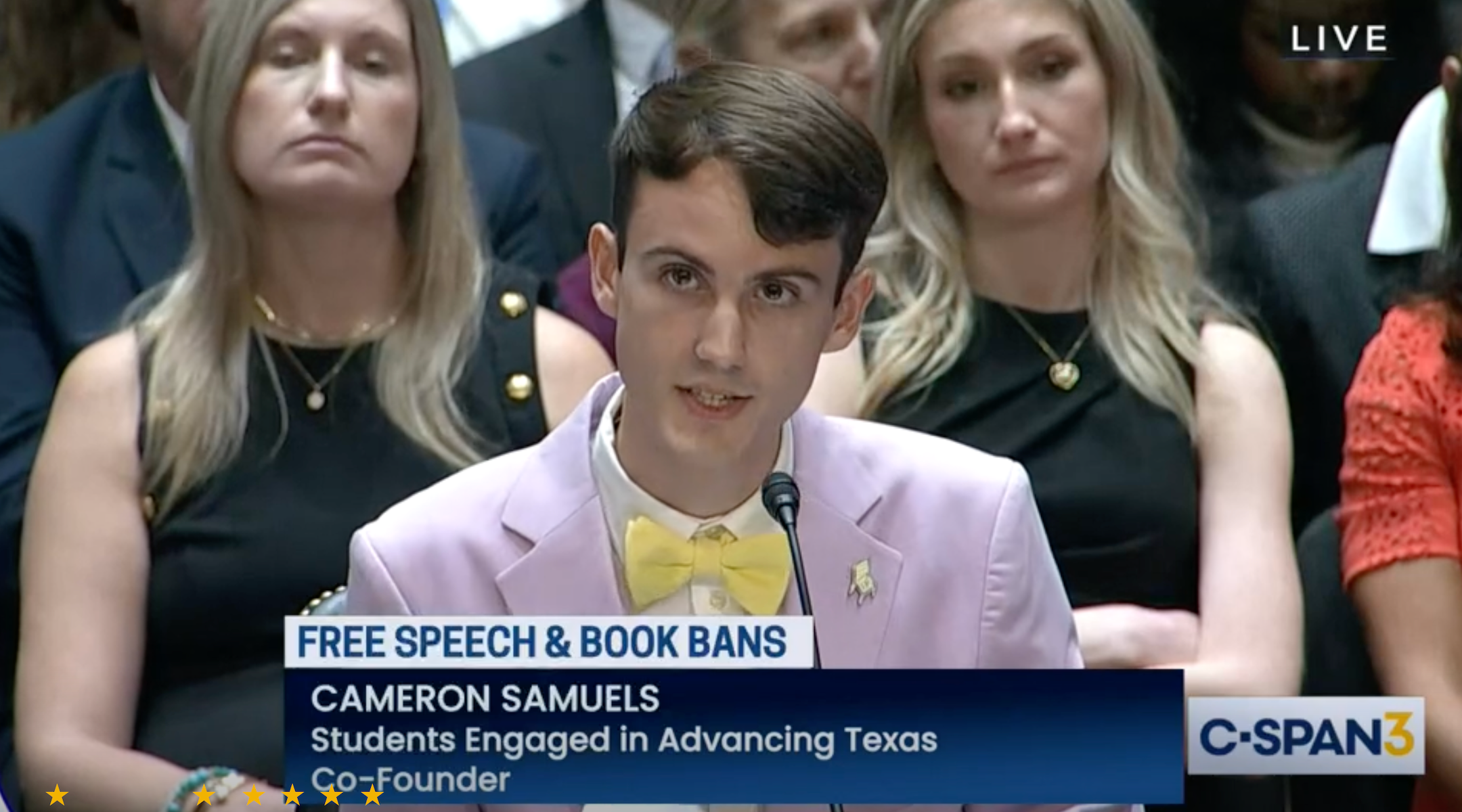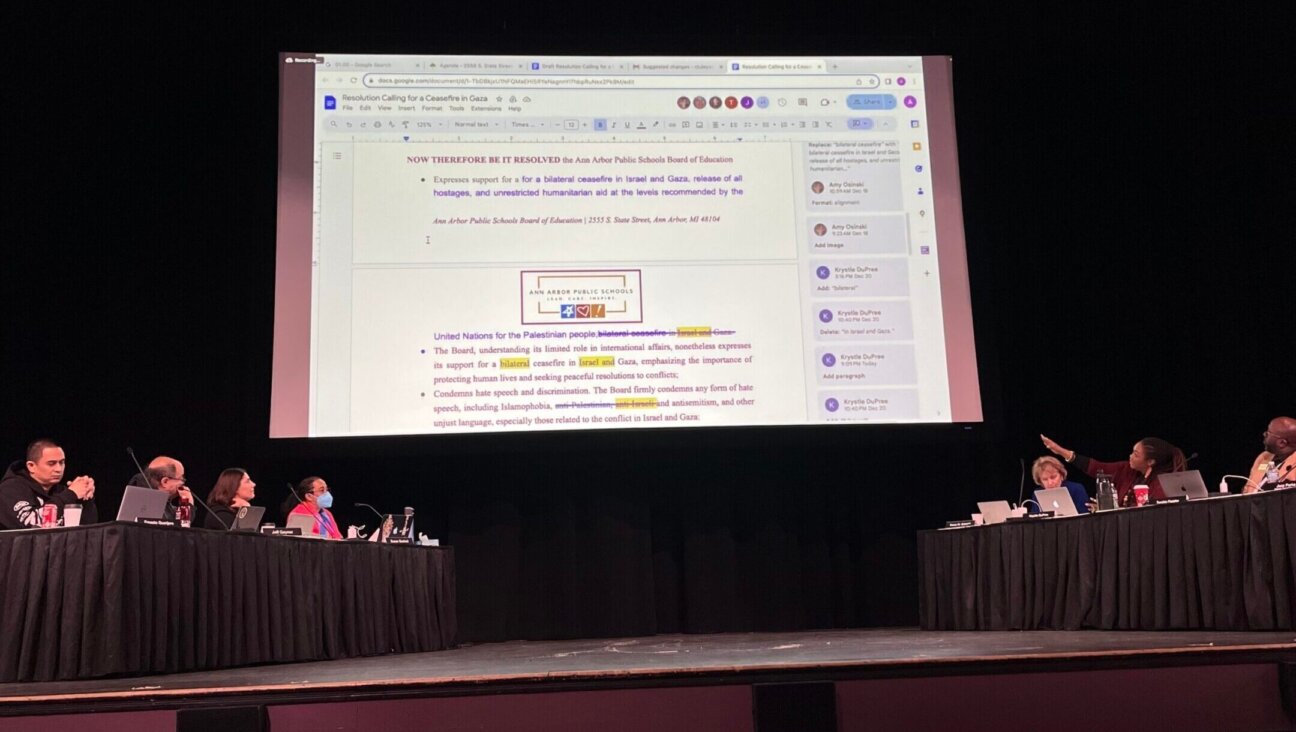‘Maus,’ Nazi parallels and a Shylock reference make appearances at Senate hearing on book bans
Senators and witnesses debated what level of parental involvement is appropriate in public schools and libraries

Cameron Samuels, a Jewish college student and book-access activist, discusses the impact of their Texas high school’s challenge to “Maus” at a Senate hearing on book bans, Sept. 12, 2023. (Screenshot via C-SPAN)
(JTA) – Nazi book burnings, antisemitic attacks on high school students and Shylock were all invoked during a Senate hearing on school book bans Tuesday morning.
The hearing brought to Capitol Hill the debate over how much control parents should have over what kinds of books their children can access in their school and public libraries — and whether it constitutes a “ban” when a book is removed because of their activism.
The hearing comes as a national movement of “parents’ rights” groups, stoked in some cases by Republican lawmakers, have brought challenges against thousands of books in school libraries, saying that they are not appropriate for children. The vast majority of the challenged books deal with topics of race, gender and sexuality; Jewish books have also been ensnared, with the Holocaust-themed “Maus” and an illustrated adaptation of Anne Frank’s diary among the highest-profile book removals.
“Extremists continue to fight popular graphic novels like ‘Maus’ and other books,” Illinois Democratic Dick Durbin, the judiciary committee chair, said during his opening remarks. Art Spiegelman’s comic-book memoir about his parents’ survival of the Holocaust was the first book named at the hearing, closely followed by texts including Margaret Atwood’s “The Handmaid’s Tale” and Maya Angelou’s “I Know Why the Caged Bird Sings.”
“Limiting access to a book about antisemitism or racism does not protect students from the actual history or the reality that hate still exists,” Durbin said, before introducing Illinois’ Democratic secretary of state as a witness. Illinois recently passed a law aimed at curbing book bans. It would revoke state funding to libraries that remove books for partisan or ideological reasons.
An opening video at the hearing produced by Senate Democrats also emphasized the widely publicized case of a Tennessee district that removed “Maus” from its middle school curriculum, and featured a quote from Spiegelman. “Maus” has also been removed or nearly removed from additional districts in Missouri, Iowa and elsewhere.
One of the Democratic majority’s witnesses on the panel was a Jewish college student and book-access activist named Cameron Samuels. Samuels, who is nonbinary and uses they/their pronouns, described how a challenge to “Maus” at their Katy, Texas, high school felt like an attack on their Jewish identity.
“When Katy targeted Art Spiegelman’s ‘Maus,’ I could not fathom how cartoon mice walking shamefully naked towards the gas chambers were considered sexual by the book’s challengers,” Samuels, a Brandeis University undergraduate who has received a Teen Tikkun Olam award from the Helen Diller Family Foundation, told the panel.
“My ancestors fled religious persecution in Eurasia. I faced too many antisemitic remarks in school to remember,” Samuels continued. “Classmates told me the Holocaust did not exist. Many could not name a Jewish person so they learned about Judaism through media representation, often dominated by stereotypes. Books like ‘Maus’ teach accurate reflections of Jewish identity.
“If a friend knew the real extent of the Holocaust,” Samuels continued, “maybe they would have thought twice before spraying cologne in my face, saying he was ‘gassing the Jew.’”
Durbin and Samuels further invoked the book-burning activities of Nazi Germany in their objections to parental challenges. But conservatives at the hearing, in addition to disputing the definition of “book ban,” also fought the Nazi comparison.
“My public school did not carry ‘Mein Kampf.’ Was it banned? I don’t know,” Max Eden, a research fellow at the conservative American Enterprise Institute who was a witness at the hearing, testified, referring to Hitler’s manifesto. “I’ve read a few books about this era since, and I’ve so far missed the part where the Nazi Party forced schools to relocate books to guidance counselors’ offices.”
Nicole Neily, president of the conservative parents’ rights activist group Parents Defending Education, also disputed the comparison, claiming, “Headlines and research papers by activist organizations have intentionally muddled the waters between World War II book burning and what is happening in America’s K-12 schools.”
Later, referencing Muslim parents in Maryland and Michigan who have organized to protest books about sexuality in their school districts, Neily added, “To conflate that issue, that I don’t want my child to be forced to read something with a book that is being burned in Nazi Germany, is disingenuous and false.”
During her testimony, Neily also claimed that librarians and freedom-to-read activists were on a mission to “extract a pound of flesh” from book-challenging parents by having them “pilloried in the public square.” The phrase “pound of flesh” comes from William Shakespeare’s “The Merchant of Venice,” which features Shylock, an antisemitic depiction of a Jewish money-lender who demands a pound of flesh from a client unable to pay his debts.
Present at the hearing were Republican Senators from Tennessee, Iowa, Missouri and South Carolina, all states where Jewish books including “Maus” and Bernard Malamud’s “The Fixer” have been challenged or removed from public schools. None addressed those books. Instead, many of them used their time to accuse publishers, tech companies and the Biden administration of silencing conservative voices, or pivoted the hearing to a debate over immigration reform. John Kennedy, a Republican senator from Louisiana, turned heads when he used his allotted time to read sexually explicit passages from frequently challenged LGBTQ-themed books “Gender Queer” and “Lawn Boy” into the Congressional Record.
The hearing wasn’t the first time “Maus” bans had been invoked on Capitol Hill. Earlier this year, Democratic House Minority Leader Hakeem Jeffries declared, “Extreme MAGA Republicans want to ban books on the Holocaust,” while holding up a copy of “Maus” during a press conference. Jeffries was opposing a House bill passed by Republicans that would grant parents greater influence over their children’s educational materials.
This article originally appeared on JTA.org.
A message from our Publisher & CEO Rachel Fishman Feddersen

I hope you appreciated this article. Before you go, I’d like to ask you to please support the Forward’s award-winning, nonprofit journalism so that we can be prepared for whatever news 2025 brings.
At a time when other newsrooms are closing or cutting back, the Forward has removed its paywall and invested additional resources to report on the ground from Israel and around the U.S. on the impact of the war, rising antisemitism and polarized discourse.
Readers like you make it all possible. Support our work by becoming a Forward Member and connect with our journalism and your community.
— Rachel Fishman Feddersen, Publisher and CEO




























